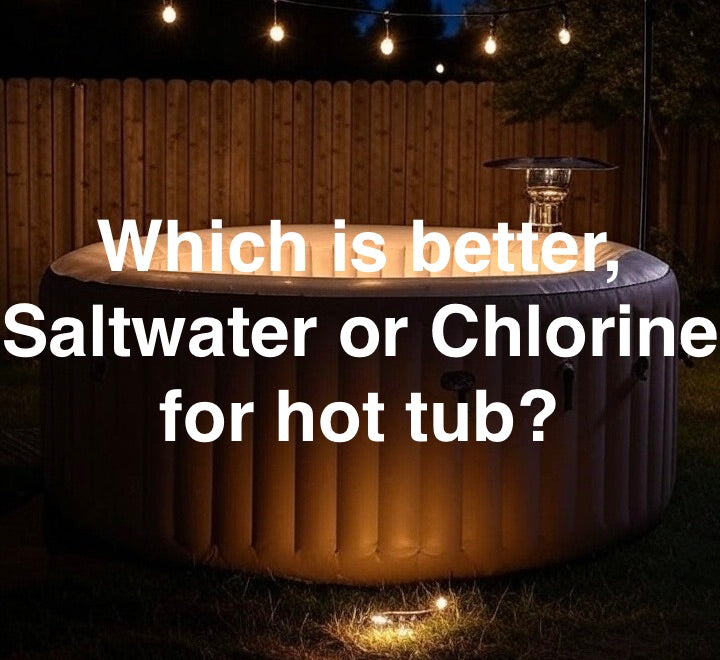
Which is better for Hot Tubs, Saltwater or Chlorine?
Ever dreamt of sinking into a warm, bubbly hot tub after a long day, only to get stuck wondering which system is best—saltwater or chlorine? You’re not alone. Many UK spa owners face the same dilemma.
The short answer? Neither is “better” for everyone. Saltwater feels softer and needs less day-to-day effort, while chlorine is cheaper upfront and easier to set up. Keep reading as we break down the pros, cons, and everything in between—so you can choose the system that actually fits your lifestyle.
What is a Saltwater Hot Tub?
A saltwater hot tub isn’t chlorine-free (despite what the name might suggest). Instead, it uses a clever gadget called a chlorine generator—also known as a salt cell.
This device converts dissolved salt into chlorine using a process called electrolysis. That means the water sanitises itself automatically, without you fiddling around with chlorine tablets every week.
The result? A tub that feels gentler, smells fresher, and doesn’t demand constant attention.
What is a Chlorine Hot Tub?
Chlorine hot tubs are the traditional option. Instead of a generator, you add chlorine directly—using tablets, granules, or liquid.
It’s simple, reliable, and widely used in homes across the UK. Because it’s the most common method, chemicals are easy to find in local shops or online.
While it involves a bit more regular testing and balancing, it’s a straightforward system that spa owners have trusted for decades.
Saltwater Hot Tubs: Pros and Cons
Pros of Saltwater Hot Tubs
-
Gentler on skin and eyes – Perfect if you or your kids have sensitive skin. The chlorine produced is softer, so no itchy dryness after a soak.
-
Lower daily maintenance – Once it’s set up, the system quietly does the hard work for you. No more juggling chlorine tablets every other day.
-
Luxurious feel – Many owners say the water feels silkier, almost like bathing in soft mineral water.
-
Less chemical smell – Without manually added chlorine, you avoid that overpowering “swimming pool” aroma.
Cons of Saltwater Hot Tubs
-
Higher upfront cost – Saltwater generators bump up the initial price, which can be off-putting if you’re budget-conscious.
-
Corrosion risk – Salt and metal aren’t the best of friends. Without proper upkeep, parts like heaters and jets could wear down faster.
-
Specialist upkeep – While everyday maintenance is lighter, the salt cell itself needs cleaning and eventually replacing.
-
Cold weather quirks – In the UK’s chillier months, some salt systems may struggle to produce chlorine efficiently.
Chlorine Hot Tubs: Pros and Cons
Pros of Chlorine Hot Tubs
-
Lower initial spend – No fancy equipment needed, making it the cheaper way to get started.
-
Widely available – Chlorine products are everywhere, from garden centres to supermarkets.
-
Fast-acting – Great if you need quick results, especially after heavy use or a weekend party.
-
Tried and tested – It’s been the go-to method for years, so you know exactly what you’re getting.
Cons of Chlorine Hot Tubs
-
Harsher on skin and eyes – Some users find chlorine a little too strong, leading to redness or irritation.
-
The smell factor – Chlorine odour is unmistakable, and not everyone finds it relaxing.
-
Regular testing needed – You’ll need to check and balance levels more often, which can feel like a chore.
-
pH ups and downs – Chlorine can cause water chemistry to fluctuate, meaning more time spent adjusting levels.
Key Factors for Consideration

So, how do you decide? Here are the big things to weigh up:
-
Cost – Saltwater costs more at the start but may save on chemicals later. Chlorine is cheaper upfront but needs regular top-ups.
-
Maintenance – Do you want “hands-off” or don’t mind rolling up your sleeves for regular checks?
-
User experience – Sensitive skin, or do you just want silky water that feels a little more indulgent? Saltwater might win you over.
-
Climate – The UK’s colder weather can affect how well saltwater systems generate chlorine.
Final Recommendation: Which is Better for You?
There’s no one-size-fits-all answer here—it depends on what matters most to you.
-
If you crave a luxurious, low-effort soak and don’t mind paying more upfront, go for a saltwater hot tub.
-
If you prefer a budget-friendly, no-nonsense setup and don’t mind a bit more maintenance, stick with chlorine.
Either way, both systems give you clean, safe, and relaxing water. The real win? Finding the option that keeps your family happy, your skin comfortable, and your spa nights stress-free.



Leave a comment